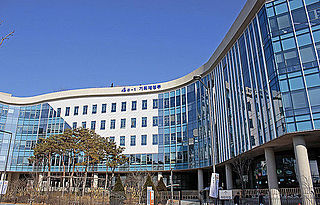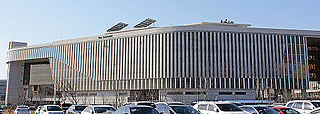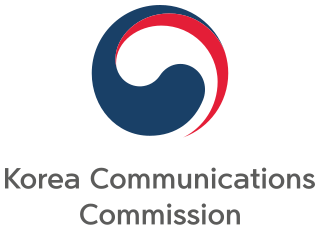In South Korea, telecommunications services improved dramatically in the 1980s with the assistance of foreign partners and as a result of the development of the electronics industry. The number of telephones in use in 1987 reached 9.2 million, a considerable increase from 1980, when there were 2.8 million subscribers.

The Republic of Korea Armed Forces, also known as the ROK Armed Forces, are the armed forces of South Korea. The ROK Armed Forces is one of the largest and most powerful standing armed forces in the world with a reported personnel strength of 3,600,000 in 2022.

The Ministry of Foreign Affairs is an executive department of the Government of Japan, and is responsible for the country's foreign policy and international relations.

Chongqing University of Posts and Telecommunications is a public university in China's fourth largest municipality: Chongqing. It focuses on the research and education in the field of information and communications and enjoys nationwide reputation in the study of postal communications, telecommunications and information technology, especially for its research and commercialization in 3G mobile technologies, optical sciences and related digital research. It is one of the four universities of Posts and Telecommunications in China and the only one of its kind in the Southwest China. It enjoys a good reputation in the ICT industry in China due to its high-quality education and research and the large number of alumni working in the ICT industry. Due to its achievements and contributions in the field of information and communications technology, especially in the development of China's own digital communications systems, CQUPT is considered as the cradle of China's digital communications.
Censorship in South Korea is implemented by various laws that were included in the constitution as well as acts passed by the National Assembly over the decades since 1948. These include the National Security Act, whereby the government may limit the expression of ideas that it perceives "praise or incite the activities of anti-state individuals or groups". Censorship was particularly severe during the country's authoritarian era, with freedom of expression being non-existent, which lasted from 1948 to 1993.

The Government of South Korea is the national government of the Republic of Korea, created by the Constitution of South Korea as the executive, legislative and judicial authority of the republic. The president acts as the head of state and is the highest figure of executive authority in the country, followed by the prime minister and government ministers in decreasing order.

The Ministry of Trade, Industry and Energy is a ministry under the Government of South Korea. It is concerned with regulating economic policy, especially with regard to the industrial and energy sectors. The ministry also works to encourage foreign investment in Korea.

The Ministry of Economy and Finance oversees the financial policies of the South Korean government. It publishes a monthly report on the national economy, known as the "Green Book." The current minister is Choo Kyung-ho. The headquarters is in the Sejong Government Complex in Sejong City.

The Ministry of Culture, Sports and Tourism (MCST) is a central government agency responsible for the areas of tourism, culture, art, religion, and sports. It has two vice ministers, three assistant ministers, one commission, and over 60 divisions. The first Minister of Culture was novelist Lee O-young.

The Ministry of Health and Welfare is a branch of the government of South Korea. The headquarters is in Sejong City. Previously the headquarters were on floors 6 through 12 of the Hyundai Building in Jongno District, Seoul, when they were the Ministry for Health, Welfare and Family Affairs.
Choo Byung-jik was 13th South Korean Minister for Construction.

Sejong, officially the Sejong Special Self-Governing City, is a special self-governing city and the de facto administrative capital of South Korea.
An information minister is a position in the governments of some countries responsible for dealing with information matters; it is often linked with censorship and propaganda. Sometimes the position is given to a separate Minister of Culture.

Korea Communications Commission is a South Korean media regulation agency modeled after the Federal Communications Commission of the United States of America. It was established on February 29, 2008, combining the former Korean Broadcasting Commission and the Ministry of Information and Communication. The five members of the Commissioners make a decision.

Internet censorship in South Korea is prevalent, and contains some unique elements such as the blocking of pro-North Korea websites, and to a lesser extent, Japanese websites, which led to it being categorized as "pervasive" in the conflict/security area by OpenNet Initiative. South Korea is also one of the few developed countries where pornography is largely illegal, with the exception of social media websites which are a common source of legal pornography in the country. Any and all material deemed "harmful" or subversive by the state is censored. The country also has a "cyber defamation law", which allow the police to crack down on comments deemed "hateful" without any reports from victims, with citizens being sentenced for such offenses.

The Cabinet of Democratic People's Republic of Korea or North Korea (Naegak) is, according to the Constitution of North Korea, the administrative and executive body and a general state-management organ in the Government of North Korea. The Cabinet's principal newspaper is Minju Choson.
In 2013, there were two major sets of cyberattacks on South Korean targets attributed to elements within North Korea.
The State Council of the Republic of Korea is the chief executive body and national cabinet of the Republic of Korea involved in discussing "important policies that fall within the power of the Executive" as specified by the Constitution. The most influential part of the executive branch of the Government of South Korea are the ministries.

The Ministry of Personnel Management is an independent organisation under Office of Prime Minister of South Korea responsible for human resource management of the executive branch of the government. It also oversees the government employees pension which is managed by Government Employees Pension Service. It is led by vice-ministerial-level Minister of Personal Management. The current Ministry was formed in 2014 and moved to its current headquarters in Sejong City in 2016. Its history can be traced back to 1948 when Bureau of Personal Management was created under now-Ministry of the Interior and Safety and Presidential Commission on Higher Civil Service Examination.













